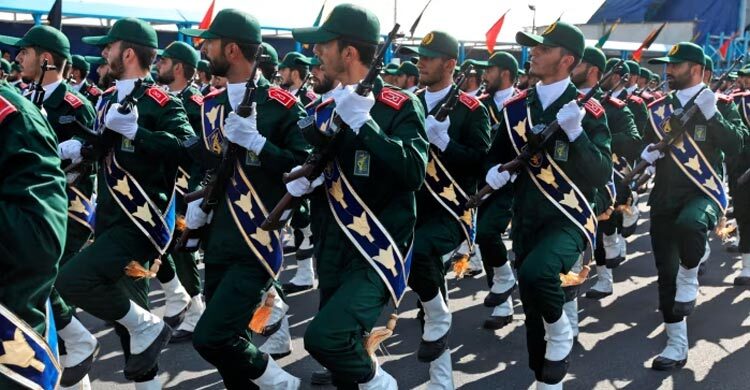US and EU prepare fresh sanctions against Iran after Israel attack

The US and EU are preparing fresh sanctions on Iran’s missile and drone programme in response to the Islamic republic’s attack on Israel, but the UK and European governments are resisting pressure to designate the elite Revolutionary Guards a terrorist organisation.
Janet Yellen, US treasury secretary, on Tuesday said the administration was poised to take “additional sanctions action against Iran in the coming days”. The US would work with allies over measures to disrupt “the Iranian regime’s malign and destabilising activity”, Yellen said, while adding there may be “more to do” on Tehran’s oil trade.
A growing majority of EU capitals support the new sanctions, which would target the Iranian networks that supply Iran-backed militant groups across the region, according to four people briefed on the matter.
But some European officials are wary of further escalating tensions with moves that target the so-called axis of resistance - which includes Hizbollah in Lebanon, Hamas in Gaza, Houthi rebels in Yemen and Iraqi militias - during such a volatile period in the Middle East.
Annalena Baerbock, German foreign minister, said the EU had already imposed sanctions on Iranian military supplies used by Russia in its war against Ukraine.
She added that late last year Germany, France and other EU partners pushed to broaden the scope of the sanctions to other types of missiles in Iran’s arsenal, “in view of the way Iran and its proxies are destabilising the Middle East”.
This was now likely to happen. “I hope that we as the EU can now finally take this step together,” Baerbock said.
In addition to blacklisting Iran’s missile and drone programmes, the US will also target entities supporting the IRGC and Iran’s defence ministry, US national security adviser Jake Sullivan said.
“These new sanctions and other measures will continue a steady drumbeat of pressure to contain and degrade Iran’s military capacity and effectiveness and confront the full range of its problematic behaviours,” he said.
Western governments have been working on a co-ordinated response to Iran’s weekend missile and drone attack against Israel and will discuss their options at this week’s G7 meeting of foreign ministers in Italy. Yet while they are keen to be seen to be taking strong measures, they are also seeking to de-escalate regional tensions and avoid a full-blown regional conflict erupting.
“Those still against [widening the sanctions] are afraid this could destabilise the relationship with Iran and deprive us of leverage over Tehran,” said an EU official briefed on the negotiations.
The G7, as well as the EU itself, said after the Iranian attack that it was ready “to take further measures now and in response to further destabilising initiatives”.
Iran, which launched the attack in retaliation for a suspected Israeli strike on its consular building in Damascus this month, is already under hundreds of western sanctions.
Proscribing the 120,000-strong Revolutionary Guards, the most powerful wing of Iran’s military, as a terrorist organisation would be a more severe response than expanding the anti-drone sanctions.
But European and UK officials are worried that such a move would risk retaliation from Iran, including the potential that Tehran would cut diplomatic ties or target dual-nationals in their countries.
The Netherlands, Sweden and Czech Republic have called for measures directly targeting the Revolutionary Guards, three diplomats said, but that was rejected by multiple countries, including Germany and France. EU sanctions require all 27 member states to agree.
German officials say the legal conditions for putting the Revolutionary Guards on the EU terror list have not been fulfilled. In particular, the group has not carried out a terror attack in the EU.
“They’re against ‘turning over the table’,” said the EU official, adding that imposing sanctions on the Revolutionary Guards would be “a declaration of war”.
The Guards operate in parallel to Iran’s conventional army to protect the republic from domestic and foreign threats. Its Quds Force, which is responsible for foreign operations, co-ordinates training and arms with the myriad militant groups Iran backs across the region.
Sanam Vakil, Middle East director at Chatham House, said the European capitals were trying to “tread the line between de-escalation and showing a meaningful response to Iran’s attack”.
“But there’s still debate about the utility of proscription” of the Guards, “as well as the broader impact it could have on security”, Vakil said.
It is unusual for a government to designate another state’s military as a terrorist organisation, although the US gave this designation to the Guards in 2019 under then-president Donald Trump.
Rishi Sunak, prime minister of the UK, which began a review on proscribing the Guards in 2022, said on Monday that the organisation posed a “significant threat to the safety and security of the UK and our allies”.
There has long been a split within the UK government over proscribing the Revolutionary Guards, with some officials arguing such a step would lead Tehran to sever relations with the UK altogether. They argue the British embassy in Tehran is valuable to the US as well to the UK.
Josep Borrell, the EU’s chief diplomat, said after a virtual meeting of EU foreign ministers on Tuesday evening that Brussels officials would begin work on the text of new sanctions, on the request of member states.
Discussions are expected to continue at a meeting of EU leaders in Brussels on Wednesday. “We’re not going to raise the tension,” said another EU diplomat. “Sanctions beyond drones to include the Revolutionary Guard are completely excluded.”
Christiane Hoffmann, spokesperson for German Chancellor Olaf Scholz, said: “We already have a very comprehensive sanctions regime [on Iran]. We will now consult with our EU partners on whether and in what form the sanctions can be toughened up further.”
Source: Financial Times





